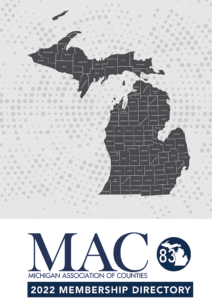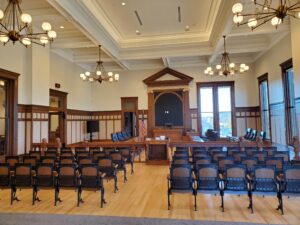 Governor proposes increase in County Revenue Sharing
Governor proposes increase in County Revenue Sharing
State Budget Director Chris Harkins presented Governor Whitmer’s FY 2023 budget recommendations to the legislature this week. The $74 billion budget represents a 6 percent increase over the current 2021-22 fiscal year and includes historic one-time funding and ongoing funding for state departments and local governments.
County and local governments would get a 10% revenue sharing increase under the proposal- a 5 percent increase in statutory revenue sharing that would be built into the base and 5 percent one-time increase. An additional $376,000 would be provided for county revenue sharing and the County Incentive Program. These funds would be split between Emmet County, the last county to re-enter the state revenue sharing program, and Leelanau County which returned during the 2022 fiscal year.
Other recommendations include:
- $578M in new federal funding for roads, bridges, airports, local and intercity transit, and rail
- $377.8M would fund road and bridge construction
- $283.4M for state roads and bridges
- $94.4M for local roads and bridges
- $500M in Water infrastructure improvements to support lead service line replacements, consolidation of failing septic systems, and contamination risk reduction
- $325M in one‐time funds to design and construct a new psychiatric hospital campus that would ultimately replace the state-operated beds at Hawthorn Center and the Walter P. Reuther State Hospital
- $175M Judicial case management to create a single statewide case management system that aligns with the Trial Court Funding Commission’s recommendations
- $148.9M for Michigan Indigent Defense Commission grants to local funding units for complying with MIDC standards
- $15M for the Jail Diversion Fund which provides grants to local entities to establish and expand jail diversion programs
- $5M for a prosecutorial diversion program affording eligible pretrial defendants an opportunity to obtain and maintain gainful, full-time employment with an eligible employer for a year
- $4.2M for the county veteran service fund
Additionally, the Governor proposed a $51.8 million deposit to the Budget Stabilization Fund, which would bring the rainy-day fund balance to nearly $1.5 billion.
The full executive budget recommendations can be found here.
For more information on the Governor’s budget proposal, contact Deena Bosworth at bosworth@micounties.org.
 Healthcare spending bill passed by Legislature; bill sent to governor
Healthcare spending bill passed by Legislature; bill sent to governor
State lawmakers landed on a final version of a $1.2 billion healthcare-focused supplemental bill this week. House Bill 5523 introduced by Rep. Julie Calley (R-Ionia) includes appropriations to address healthcare recruitment and retention, as well as funding for COVID-19 early treatment and various testing supports.
Some highlights of the spending bill include:
-$300 million for eligible health care recruitment, retention, and training programming for new investments. A health care provider must demonstrate an eligible qualifying need under the rules and regulations of the federal coronavirus state fiscal recovery funding and must not request funds for any investments related to recruitment or retention announced before December 1, 2021. The bill also requires 75% be allocated for acute care and behavioral health care providers, which would be administered by the Michigan Health and Hospital Association and requires 25% be allocated to post-acute care providers and Federally Qualified Health Centers.
– $10 million as a competitive grant program for nursing facilities to convert multi-resident rooms into single resident rooms. Grant awards would reimburse 50% of the cost, and DHHS would have to prioritize converting rooms with more than 2 residents into single resident rooms.
– $29 million to assist nursing homes fund physical repairs and improvements of the facility. There is a $500,000 cap for each nursing home.
-$29.7 million to local and tribal health departments, as well as schools, to support staffing costs of COVID-19 testing and contact tracing. $14.9 million specifically goes to school districts, public school academies, intermediate school districts, and nonpublic schools. The bill prohibits the department of health and human services from allocating funds to any local public health departments in which a county board of commissioners has passed a resolution rejecting these funds within 30 days of effective date of this act.
-$10 million for program and planning for a new state public health and environmental science laboratory.
A further detailed analysis can be found here. Gov. Whitmer has signaled she does plan to sign the bill when it officially lands on her desk.
For more information, please contact Meghann Keit-Corrion at keit@micounties.org.
 Binding Arbitration expansion bill clears Senate committee
Binding Arbitration expansion bill clears Senate committee
This week, the Senate Small Business and Economic Development committee unanimously passed House Bill 4725, sponsored by Rep. Robert Bezotte (R-Howell), The bill would expand binding arbitration beyond police and fire labor bargaining units to county correctional officers. The bill is now on the Senate floor awaiting a vote.
MAC has long opposed any expansion of binding arbitration to other bargaining units due to the cost of the process, the long-term liabilities associated with third-party decisions and the unequal treatment such a system provides to those bargaining units. The Michigan Public Employment Relations Act already provides for bargaining rights without tying the hands of the county in binding arbitration.
MAC asks members to use our Advocacy Center to send a pre-drafted message of opposition to their state senators.
For more information on this issue, contact Deena Bosworth at bosworth@micounties.org.
 Staff picks
Staff picks
- Solar Energy Property Taxation (Center for Local, State and Urban Policy)
- State of Michigan Mental Health Facilities (map) (Senate Fiscal Agency)
- Florida man steals car; train sends it crashing into house (Associated Press)
- Why buying a car is still such a miserable experience right now (National Public Radio)

 Attendees at the 2022 Legislative Conference will have a dozen breakout sessions to choose from on trending issues in county governance, MAC announced this week. Each breakout session will be approximately one hour long and include time for questions from the audience of the experts and policymakers presenting at them:
Attendees at the 2022 Legislative Conference will have a dozen breakout sessions to choose from on trending issues in county governance, MAC announced this week. Each breakout session will be approximately one hour long and include time for questions from the audience of the experts and policymakers presenting at them: MAC member directories arriving soon
MAC member directories arriving soon
 The Michigan Green Communities Challenge is now live! Create your account and take the Challenge now at
The Michigan Green Communities Challenge is now live! Create your account and take the Challenge now at  On Jan. 6, the U.S. Department of Treasury released the Final Rule for the $65.1 billion Coronavirus State and Local Fiscal Recovery Fund (Recovery Fund). Under the Final Rule, counties have broad flexibility for uses that strengthen the public health infrastructure, including workforce support, new eligibilities for capital expenditures, public health data systems and more.
On Jan. 6, the U.S. Department of Treasury released the Final Rule for the $65.1 billion Coronavirus State and Local Fiscal Recovery Fund (Recovery Fund). Under the Final Rule, counties have broad flexibility for uses that strengthen the public health infrastructure, including workforce support, new eligibilities for capital expenditures, public health data systems and more. Updates and restorations projects to prepare Lenawee County’s “Old Courthouse” for the next 100 years came together in early 2020. Careful considerations to both the interior and exterior were given to energy efficiency, mechanical updates and floorplans designed to bring accessible technology and a comfortable environment to this 135-year-old courthouse, while preserving the history and period look of a local landmark.
Updates and restorations projects to prepare Lenawee County’s “Old Courthouse” for the next 100 years came together in early 2020. Careful considerations to both the interior and exterior were given to energy efficiency, mechanical updates and floorplans designed to bring accessible technology and a comfortable environment to this 135-year-old courthouse, while preserving the history and period look of a local landmark.  Georgia yellow pine is used throughout the building and master crafters expertly blended new wainscoting and trim work to replace broken, missing and damaged places.
Georgia yellow pine is used throughout the building and master crafters expertly blended new wainscoting and trim work to replace broken, missing and damaged places. The drop-down ceiling was removed from the chambers and a coffered ceiling was revealed to be in relatively good condition. During the restoration process, it was discovered that there was another ceiling above the coffers, a medallion ceiling; and bits of the original fresco paintings were spotted, but that ceiling was in very poor condition. To the best of our knowledge, the coffered ceiling was installed around the time when gas lighting was replaced with electrical, around 1900.
The drop-down ceiling was removed from the chambers and a coffered ceiling was revealed to be in relatively good condition. During the restoration process, it was discovered that there was another ceiling above the coffers, a medallion ceiling; and bits of the original fresco paintings were spotted, but that ceiling was in very poor condition. To the best of our knowledge, the coffered ceiling was installed around the time when gas lighting was replaced with electrical, around 1900. Four columns built of hard-burned brick, laid in cement mortar and flushed with cement are set in the center of the building and extend from the foundation to the cupola on top; this is referred to as “the tower.” The tower is filled with stone arches and columns, with impressive carvings.
Four columns built of hard-burned brick, laid in cement mortar and flushed with cement are set in the center of the building and extend from the foundation to the cupola on top; this is referred to as “the tower.” The tower is filled with stone arches and columns, with impressive carvings.  Updating the Open Meetings Act to meet the 21st century needs of state residents and preventing an ill-advised attempt to privatize Michigan’s locally directed system of public mental health services head the
Updating the Open Meetings Act to meet the 21st century needs of state residents and preventing an ill-advised attempt to privatize Michigan’s locally directed system of public mental health services head the  MAC’s Podcast 83 team
MAC’s Podcast 83 team  In a brisk delivery from an industrial plant Wednesday evening, Gov. Gretchen Whitmer emphasized political cooperation and calls for tax cuts in her
In a brisk delivery from an industrial plant Wednesday evening, Gov. Gretchen Whitmer emphasized political cooperation and calls for tax cuts in her  The U.S. Treasury has issued the following important clarifications on how to report revenue replacement and other expenditures in the Project and Expenditure Report, said the National Association of Counties this week:
The U.S. Treasury has issued the following important clarifications on how to report revenue replacement and other expenditures in the Project and Expenditure Report, said the National Association of Counties this week: Bills purporting to modernize Michigan’s requirements for local governments to issue public notices got a thumbs down by MAC in a House hearing this week.
Bills purporting to modernize Michigan’s requirements for local governments to issue public notices got a thumbs down by MAC in a House hearing this week.





